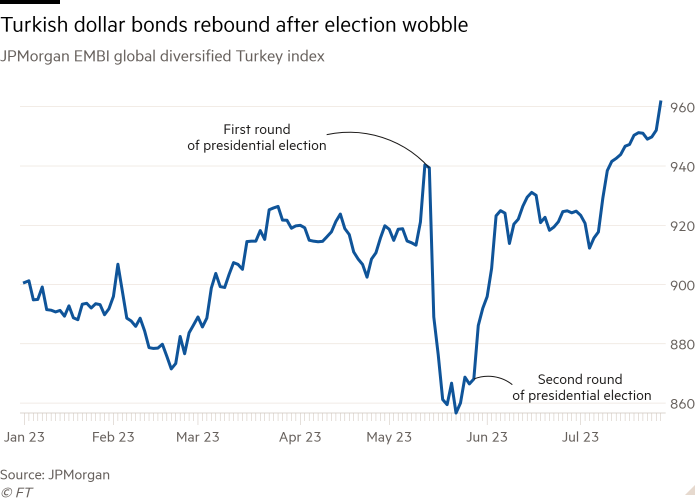Runaway inflation fuels blistering rally in Turkey’s stock market

We’ll send you a myFT Daily Digest email rounding up the latest Turkish economy news every morning.
Turkish equities have posted blistering gains this summer as an economic policy overhaul and fears about a fresh flare-up in inflation draw local savers and foreign investors into the market.
The benchmark Bist 100 index has soared 46 per cent since the end of May. The gauge gained 14 per cent in US dollar terms over that period despite a huge fall in the lira, outpacing a rise of 9 per cent for MSCI’s emerging markets index, FactSet data shows.
The rally comes at a time when Turkey’s $900bn economy is in flux. A wave of stimulus measures unleashed by President Recep Tayyip Erdoğan ahead of May’s election is fuelling a fresh bout of inflation even as the country’s new economic management team attempts to restore “rational” policymaking. The two forces are working in tandem to make Turkish equities look more appealing to local savers and some foreign fund managers.
“Hopes [about the new economic policy] are pushing stocks up, but even if you are negative, betting on higher inflation, that is also helpful for equities,” said Emre Akcakmak, a senior consultant at East Capital, a specialist emerging-markets fund manager.

Foreign investors, who have largely abandoned Turkish stocks in recent years, have pumped $1.6bn into the country’s equities market in the seven weeks to July 21, according to central bank data. The inflows have come as central bank governor Hafize Gaye Erkan, a former Wall Street banker who was appointed in June, has more than doubled interest rates in an attempt to rein in inflation, which is running at almost 40 per cent.
Meanwhile, finance minister Mehmet Şimşek, a former deputy prime minister who is well-regarded by foreign investors, has boosted petrol and value-added taxes on goods and services. The move is part of an effort to cool an economy that went into overdrive after Erdoğan showered the public with giveaways, such as a month of free gas and wage increases for public workers, before May’s election, which he won.

Şimşek’s tax increases combined with the lingering effects of the pre-election stimulus are expected to send inflation climbing to nearly 60 per cent by year-end, before it begins easing over the next two years, according to central bank forecasts.
The new jolt of inflation had prompted local residents to rush into stocks in an attempt to shield their savings at a time when deposit rates offered by banks were falling, said Murat Gülkan, chief executive of OMG Capital Advisors in Istanbul. The inflation-driven buying spree is a repeat of 2022, when the same trend led Turkish stocks to a world-leading 110 per cent US dollar return.
“The market has been driven mostly by local investors for close to three years now,” Gülkan said.
Investors have also turned somewhat more hopeful that Erdoğan will at least for a time back away from his other unorthodox policies, such as a long-held objection to high interest rates, after the president last Friday appointed a trio of respected economists as deputy central bank governors.
Akcakmak said that beyond the economic factors, some investors might have been lured into Turkish stocks since they remain very inexpensive from a valuation perspective. The Bist 100 is priced at 5.8 times expected earnings over the next year, FactSet data shows. That compares with about 12 times for the MSCI EM index.
Turkish conglomerate Koç Holding last week sold a $250mn block of shares in lender Yapı Kredi in an off-exchange deal in a further sign of how the equities market is warming. Almost 40 US and European investors took part in the transaction, according to Şimşek.
Gülkan said the Yapı Kredi share sale is “more significant than the other foreign inflow numbers,” which he described as a “blip at the bottom” rather than a “sea change”.

Still, in a further sign of how sentiment around Turkish assets is gradually improving, the country’s foreign currency-denominated sovereign debt has rallied over the past two months after a sell-off during May’s election. An index collated by JPMorgan tracking the country’s international debt has jumped 12 per cent from its May lows. The cost to protect against a Turkish debt default using five-year credit default swaps has also eased to the lowest level since September 2021 after a sharp rise in May.
Still, many long-term investors say they remain cautious about Turkish assets on concerns that policymakers are moving too slowly given the scale of the country’s economic woes and as they wait to see whether Erdoğan sticks to the new economic programme.
“The evident preference for a gradual approach to normalising monetary conditions and removing distortionary regulations, and a record of politically driven policy reversals, mean that policymakers could struggle to sustainably rebuild investor confidence, reduce macro-financial stability risks and ease external vulnerabilities,” Fitch said last week.
Comments